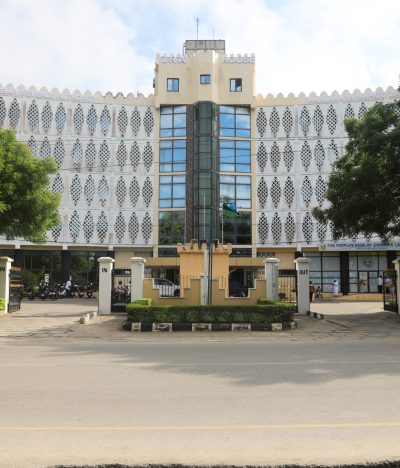The tax regime in Tanzania consists of a number of direct and indirect taxes including income tax, Value Added Tax, import duty, excise duty, and stamp duty. There are also taxes levied at the local government level. All central government taxes are administered by the Tanzania Revenue Authority (TRA).
The authority has three tax departments (Domestic Revenue, Customs and Excise, and Large Taxpayers (in respect of all taxes). TRA is headed by a Commissioner General in charge of tax collection and day to day administration. The Ministry of Finance oversees the tax policy.
Generally, Tanzania uses the self-assessment approach with a requirement to file a tax return at the end of the year. Tax payment is on a quarterly basis. Withholding tax arrangement applies to individuals deriving income solely from employment (PAYE) and also to non-resident taxpayers with Tanzania source income. VAT is accounted for monthly. Here are some of the taxes administered under the taxation system in Tanzania
1. Direct Taxes
Corporate taxes
The income tax base in Tanzania is still narrow. Taxes on consumption (customs and VAT) continue to make up the bulk of tax revenue. Employment income is heavily taxed and the tax contribution of businesses is compromised by tax exemptions and evasion. Consequently, the TRA is increasingly adopting sector-specific tax collection strategies to drive revenue collection.
Residents are liable to income tax on a worldwide basis, while non-residents pay tax only on Tanzania source income. Persons present in Tanzania for at least six months are regarded as resident for income tax purposes. Companies incorporated in Tanzania, or whose management and control is exercised from Tanzania, are also regarded, resident.
Strategic investments in priority sectors enjoy tax concessions aimed at encouraging investment flows in those sectors. These include mining, petroleum, and agriculture. Industrial activities established in the Export Processing Zones also enjoy significant tax holidays.
Corporate tax rates
The corporation tax rate is 30 percent (25 percent for companies listed on the Dar es Salaam stock exchange). This rate is in line with most of the countries in the East African Community. Branch income (of foreign companies) is taxed at 30 percent as well. There is an additional 10 percent tax on repatriated income of branches of foreign companies.
There is also what is known as “Alternative Minimum Tax” for corporations in perpetual unrelieved loss for three consecutive years attributable to tax incentives at the rate of 0.3 percent of the turnover for the third year of perpetual unrelieved loss. The impact of this provision is that companies which end up in a tax loss position as a result of various allowances by way of tax incentives will be taxed on revenue on the third year of loss-making.
Businesses are required to estimate taxable income for the year and pay tax on that income in four quarterly installments.
Generally, income tax is imposed on a company’s taxable profits after allowance for deduction on revenue expenses and wear and tear allowance on capital expenditure. There are special rules on deductions relating to deduction of interest (interest deduction is restricted to a prescribed debt/equity ratio of 70/30), losses, trading stock loses, expenditure on agricultural improvement, expenditure on research development and expenditure on environmental protection.
Noteworthy is the ring-fencing of mining operations. From July 2010, mining companies with more than one mine are required to account for tax and prepare separate tax returns for each of the mine sites under the same company. The implication of this is that losses in operations of one mine can no longer be offset against the profits of another mine.
Capital allowances are normally available on depreciable assets (excluding investments assets) used in producing income. The allowance can be on diminishing value of the asset or straight-line basis. The rates of allowances vary from 5 to 100 percent. A tax rate of 100 percent is applicable to plant and machinery used in agriculture. There is also a first-year allowance of 50 percent on the cost of the assets for items of plant and machinery used in the manufacturing process (fixed in the factory), used in fish farming or for providing services to tourists and fixed in the hotel. Depreciation rates for various classes of assets are given below:
Capital gains taxes
A separate capital gains tax was abolished in Tanzania in 2004. A realized capital gain is now accounted as part of the total income brought to charge at the end of the year. There is however what is called single installment tax on realization of interest in land, shares, and securities held in resident entity or building situated in Tanzania. The applicable rates are 10 and 20 percent of the gain for residents and non-residents respectively.
Tax losses
Tax losses are deducted in the year which they arise and any subsequent year. There is no time limit in claiming a deduction on tax losses. Foreign losses (from investment and business) are deducted from foreign income from investment and business respectively. Losses from other investments income are deducted from investment income. Also, losses from an agricultural business are deducted from income in conducting agricultural business.
Withholding taxes
The table below shows withholding tax rates which are currently in force for both residents and non residents.
Transfer pricing and anti-avoidance rules
There are no detailed transfer pricing rules in Tanzania. There is only one provision in the Income Tax Act that makes reference to transfer pricing. This provision requires transaction between associates to be such that they reflect a transaction that is undertaken at an arm’s length.
Despite lack of proper guidance and firm rules on transfer pricing, it is still imperative for related entities to maintain sufficient, proper and contemporaneous documentation that supports prices paid to an associate at an arm’s length.
Recently, the tax authority has shown willingness to apply arm’s length principles as set out in the UN and OECD transfer pricing guidelines.
Anti-avoidance provisions
Again, like transfer pricing, there is only a general anti-avoidance provision in the Income Tax Act. The provision gives power to the Commissioner to make adjustments as regards to a person’s liability to tax or lack thereof as appropriate to counteract any avoidance or reduction of liability to tax that may result as a consequence of a transaction aimed to avoid tax.
Thin capitalization
Thin capitalization rules are very new in Tanzania. As such, their application is yet to be tested. The rules came as an amendment to the income tax act in July 2010. Initially, the maximum amount of interest expense allowable for deduction should not exceed the sum of all interest income derived during the year of income plus 70 percent of the total income excluding interest income before deducting interest expense.
The balance was carried forward and treated as incurred during the next year of income. This restriction and the newly thin capitalization rules are applicable to resident entities whose 25 percent or more of the underlying ownership of the entity is held by a non-resident person.
Tax treaties
Currently, there are nine countries which have tax treaties with Tanzania. These countries are Canada, Denmark, Finland, India, Italy, Norway, South Africa, Sweden, and Zambia. All the treaties are in force. There are ongoing negotiations to finalize double tax treaties among the partner states in the East African Community.
2. Indirect taxes
VAT
VAT is charged at a standard rate of 18 percent. Export of goods and services (provided they meet the “export criteria”) are zero-rated. The threshold for registration is above TZS 40m (approximately USD 25,000). There are two VAT regimes in Tanzania – one for Mainland Tanzania and one for Tanzania Zanzibar. Taxable persons are required to file their VAT returns at the last working day of the following month. The VAT on importation is paid on importation together with customs duty.
Excise Duty
Another indirect tax is excise duty which is imposed on particular goods and services whether imported or locally produced. Services which are excisable include airtime from mobile phone operators and pay per view television. Goods subject to excise duty include fuel, beer, bottled water, cigarettes, spirits and wines and motor vehicles exceeding 1000cc.
Customs (import) duty
There is a common law relating to customs duty within the EAC member countries – The East African Community Customs Management Act, 2004.
With effect from January 1, 2010, people of the EAC member countries are not be subjected to import duty on goods moving within the region (provided they conform to the rules of origin adopted under the customs union treaty signed by the partner states). In line with the customs union is the customs common market, which is effective from July 1, 2010. This is intended to promote free movement of goods and labour within the region.
Import duty rate for goods imported from countries outside the EAC are 0% for raw material, capital goods, agricultural inputs and pure bred animals; 5% to 10% for intermediate goods; and 25% for finished goods. In addition to that, equipment and supplies imported by mining operator are taxed at 0% up to production and 5% after one year into production. Equipment and supplies imported by gas and oil explorer are taxed at 0%.
3. Personal taxes
Domicile and residency requirements
Residency status is satisfied in Tanzania if one of the following conditions exists:
- If the individual has a permanent home in Tanzania and is present in Tanzania during any part of the year of income;
- If the individual is present in Tanzania during the year of income for a period or periods amounting to aggregate 183 days or more;
- If the individual is present in Tanzania during the year of income and in each of the two preceding years of income for periods averaging more than 122 days in each such year of income; or
- The individual is an employee or an official of the Government of Tanzania posted abroad during the year of income.
Main rates and bands
The table below summarises individual tax bands and their respective tax rates as of July 2012. Tax for individual is paid in form of “Pay As You Earn”.
Gains and profits from employment includes the following amounts paid by an employer or associate of an employer; wages, salary, payment in lieu of leave , fees, commission, bonus, gratuity, subsistence, travelling, entertainment or other allowances received in respect of employment or services rendered.
Other payments made in respect of employment including benefit in kind are normally taxed at the higher of cost or fair market value. Such benefits include motor vehicle, housing, and loans.
There is no personal relief in Tanzania. Contributions to approved retirement funds are deductible for tax purposes.
Social security/national insurance payments
There are a number of approved social security funds catering for public and private sectors. A contribution of up to 10 percent of basic salary is payable by employees. Approved pension schemes are compulsory with employers contributing up 10 percent, making the total contribution 20 percent of basic salary.
4. Miscellaneous taxes
Taxes on payroll
Tax on payroll in Tanzania constitutes what is called Skills Development Levy (SDL) which is at 6 percent of the gross salary and contributions to social security funds (up to 10% of employee’s basic salary). This is at the expense of the employer. SDL is used to promote skills development through vocational training.
Taxes on property
Tax on property is usually through land rates and is administered by local government authorities.
Other taxes
Other taxes include levies charged by local government authorities on revenue generated from conducting business in the respective municipalities. This includes the City Service Levy which is 0.3 percent on revenue payable quarterly.
The Taxation system in Tanzania can be quite daunting and difficult to navigate. This is why we advise that you seek the services of one of the best law firms in Tanzania to assist you in devising tax efficient structures for your business.






